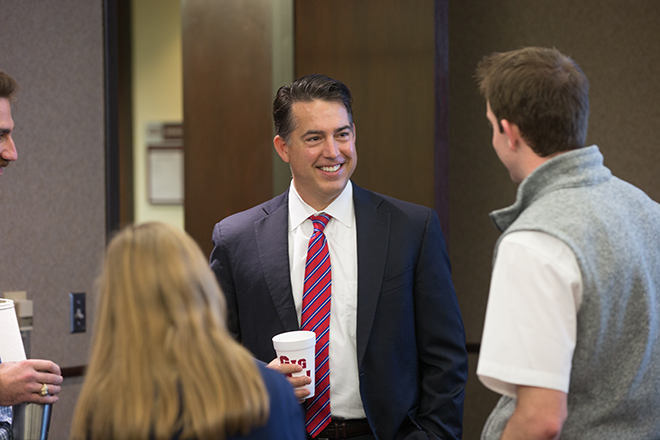Accenture director shares secrets to success in consulting
March 14, 2016
|
Mays Business School

“We are problem solvers and path finders – we work with our clients to realize their full potential and to help them become high-performing businesses or governments”, Blake Pounds ’89 told Business Honors students at Mays Business School. “Examining symptoms, diagnosing the problem, prescribing a solution and working with a business to improve productivity and efficiency is what consulting is all about.” Pounds shared his experiences and observations about the field, and described how students can thrive in an industry that demands problem solving, flexibility and interpersonal skills.
Pounds, a 25-year veteran of the field, is currently the managing director of Accenture’s Houston office. Since completing his bachelor’s in finance from Texas A&M University and an MBA in international business from The University of Texas at San Antonio, he has worked continuously with Accenture. He also serves on the board of directors of the Greater Houston Partnership and the Cynthia Woods Mitchell Pavilion.
“I was attracted to consulting for three things: The opportunity to work with sharp people, the variety of the work and the continuous learning,” he explained. “You’re constantly learning and being challenged, and you’re always encouraged to grow – personally and professionally. These are the things that have kept me at Accenture for more than 25 years.”
At the Houston office, Pounds oversees 1,800 employees in five divisions – strategy, consulting, digital, technology and operations. Under his leadership since 2013, the office has accelerated acquisition and recruiting efforts. Pounds has also been active in leading Accenture’s efforts to give back to the local community through its multiple Houston partnerships with organizations such as Genesys Works, Junior Achievement, KIPP and the Prisoner Entrepreneurship Program among others. “I like taking ideas, seeing an opportunity and working to grow it,” Pounds said of the progress of Accenture in Houston.
Throughout his career, Pounds has traveled to more than 30 countries, worked abroad on extended multi-year assignments to Mexico City and London, and gained experience working with clients in a variety of industries including financial services, chemicals, utilities and oil & gas. He shared his insights into how students can succeed in consulting.
- Be comfortable with ambiguity
“The people I see struggling in this industry are those that don’t deal well with ambiguity,” he said. “These people want to be told exactly what to expect in any situation. But the folks who are successful are those that are confident and resourceful in any situation and say to themselves, ‘Wherever I am, I have the resources I need and my firm behind me, and we’ll be able to figure out any problem.’”
- Work well with others
Pounds said consulting projects are similar to group projects in college courses, and that the team dynamics are not very different. “On a team, there are classic behaviors: someone who emerges as a leader, others who are hard workers and those who will contribute as required on specialist subjects. ” he said. Team-working is essential to the demands of the consulting industry.
- Be digitally savvy
He shared advice for Aggies preparing for jobs: Stay abreast of digital technology. “Digital technology is changing so quickly, and it’s disrupting long-standing business models,” he said. “Staying up to speed is incredibly important, irrespective of what you study in school.”
His secret to success
Consulting is all about building relationships and partnering with the right people to solve problems, Pounds explained. No matter which industry, he believes that staying in touch with clients on a regular basis is crucial to success. “There can be a tendency to be opportunistic – only reaching out to a client when they have a problem,” he said. “But it is important to know your clients and to stay in touch with them, irrespective of whether there is a current opportunity. When the time comes when they have a challenging problem to solve, they’ll tend to call the person with whom they have an ongoing relationship based on mutual trust.”


